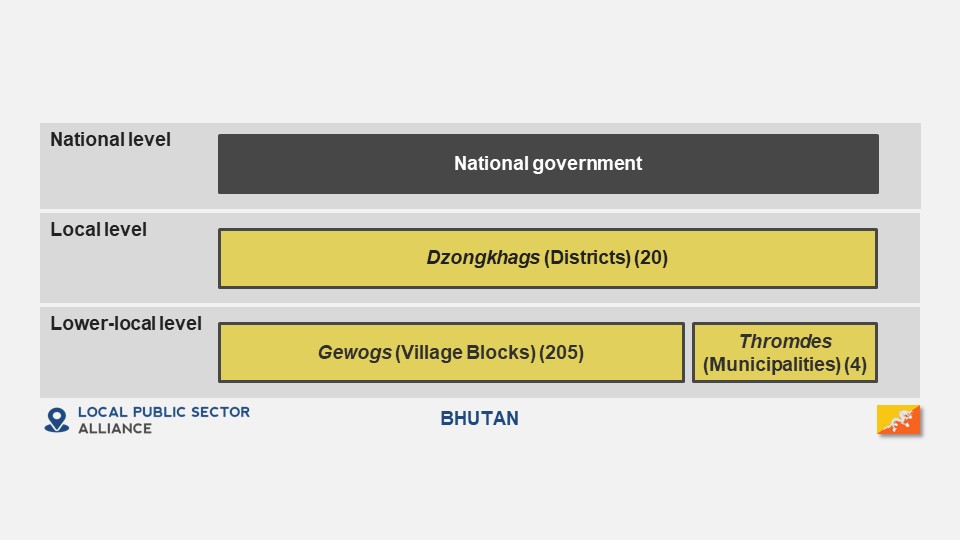
Adopted in 2008, Bhutan’s Constitution defines its form of Government as a Democratic Constitutional Monarchy. Article 22 of the Constitution is fully devoted to Local Governments. It states that “power and authority shall be decentralized and devolved to elected Local Governments”, providing the basis for three types of local governance institutions: Dzongkhags (Districts), Gewogs (Village Blocks) and Thromdes (Municipalities). Local elections were first conducted in 2011 to elect political representatives in accordance with the Election Act 2009. Candidates do not belong to any political party. Local councils are supported by civil servants recruited and managed by the Royal Civil Service Commission and rely almost exclusively on annual grants provided by the central government to finance their activities.
Subnational governance structure
The Dzongkhag forms the main layer of local government, with the Gewog and Thromde operating at the lower-local and urban level respectively. Currently, there 20 Dzongkhags (Districts), 205 Gewogs (Village Blocks) and 4 self-governing Thromdes (Municipalities) in Bhutan. The four self-governing (Class A) Thromdes include Thimphu, Phuentsholing, Gelephu and Samdrup Jongkhar. Thimphu is considered both a Dzongkhag as well as a Thromdes.
The Dzongkhag Tshogdu (District Council), Gewog Tshogde (Village Block Committee) and Thromde Tshogde (Municipal Committee) are the political bodies at the local level. Members of the Dzongkhag Tshogdu comprise the elected head of a Gewog, elected Mangmi (Deputy Head of a Gewog), one elected representative from the Dzongkhag Thromde and one elected representative from the Dzongkhag Yenlag (Satellite) Thromdes. A Chairperson is elected from among its members. The 205 Gewogs are divided into 1,044 Chiwogs (Villages). The elected Head (Gup) together with the elected representatives of the Chiwogs comprise the Gewog Tshogde. It is chaired by the elected Gup. In the four Category A Thromdes, an elected Mayor heads the committee. Elected members represent their constituencies in the Thromde Tshogde. Apart from differences arising due to geographical size of a district/block/municipality, the governance structure is uniform across the three Local Government tiers.
Nature of subnational governance institutions
Local governments in Bhutan should be considered hybrid local governance institutions (i.e., institutions that combine features of devolution and deconcentration) on account of the significant limitations in authority and autonomy imposed upon them by the central government. In particular: local governments lack legislative (i.e. law-making) powers and to a large extent must follow national policy priorities when making budgetary decisions; all administrative staff are appointed by the (central) Royal Civil Service Commission which manages deployment and career development; local governments are not free to determine their own organizational structure; local governments lack any significant sources of own-source revenue and rely almost exclusively on annual grants from the central government; and local government budgets are included in the national budget and are approved by parliament.
Functional assignments
Functional assignments to local governments is based on the Division of Responsibilities Framework (DoRF) established in 2010 and revised in 2012. Local governments are mainly in charge of areas related to socio-economic development, such as school maintenance, farm roads and irrigation, as well as strengthening climate mitigation and adaptation measures. They are also in charge of preserving promoting culture and traditions. In practice, responsibilities between levels of government often overlap due to the small size and limited capacities of local governments.
LoGICA Assessments
LoGICA Intergovernmental Profile: Bhutan 2023 (Excel)
Additional resources
Local government country profile: Bhutan (UN Women)
Bhutan Country Profile (World Observatory on Subnational Governance and Investment, OECD/UCLG)
Bhutan Urban Policy Notes: Municipal Governance and Finance (World Bank, 2019)
Public Expenditure and Financial Accountability (PEFA) Performance Assessment Report: Bhutan, 2023
Back to Local Public Sector Alliance Intergovernmental Profiles – Country Page
Last updated: April 26, 2024
